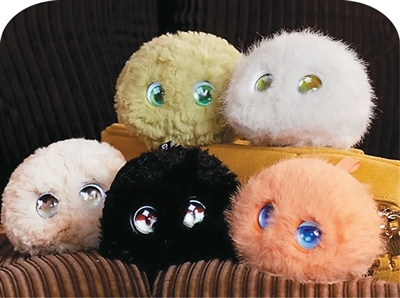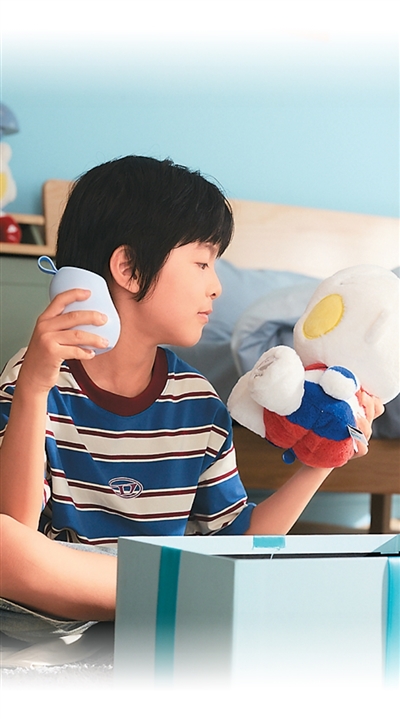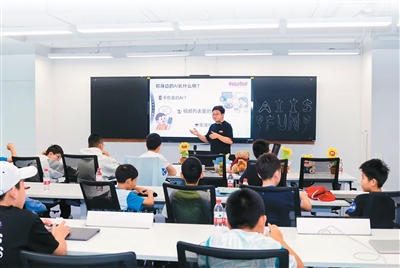




- BRNN
- BRI News
- BRNN News
- Database
Official Documents Polices and Regulations
Inter-government Documents International Cooperation BRI Countries
Business Guide Economic Data BRI Data
Trade
Investment Projects Latest projects
Cases - Content Pool
Imagine a fluffy cat doll that chats with you while displaying lively facial expressions, a smart globe that introduces local customs and cultures based on where you tap, or a small robot with a slender arm ready to play Go, Chinese chess or Gomoku.
These imaginative toys all harness artificial intelligence technologies, and such interactive, responsive "smart companions" are rapidly winning over consumers.
AI toys represent a new product category that merges advanced technologies with traditional playthings, said Feng Huiyuan, co-founder of a company in Shenzhen, south China's Guangdong Province.

Photo shows Fuzai, an AI-enabled plush bag charm developed by Shanghai Luobo Intelligent Technology Co., Ltd. (Robopoet). (Photo courtesy of the interviewee)
Through deep learning, natural language processing and affective computing, these toys can understand users, interact intelligently and provide personalized experiences and emotional companionship.
Sales of AI toys have surged in recent years. According to data from JD.com, AI toy sales in the first half of 2025 increased by more than 200 percent year on year.
Children remain the primary audience for AI toys. Targeting children aged 3 to 12, FoloToy is an AI toy robot brand under Shanghai SiliconPear Technology Co., Ltd. According to co-founder Guo Xinghua, the brand has developed a proprietary semantic understanding model tailored to children's language patterns, enabling more natural and customized interactions.
The greatest strength of AI toys lies in their ability to learn, Guo explained. They can adjust content and interaction style based on a child's age, cognitive development and emotional state. Unlike traditional educational tools with fixed content, AI toys adapt to individual differences and offer pressure-free, companionship-based learning.
AI toys from Shenzhen Haivivi Technology Co., Ltd. take emotional interaction a step further with built-in emotion recognition.

A child plays with AI toys developed by Shenzhen Haivivi Technology Co., Ltd. (Photo courtesy of the interviewee)
If a child says, "A kid at kindergarten pushed me," the toy instantly detects the emotion and responds with comfort, guidance and communication tips, said Zhong Wenjie, the company's public relations director. This emotional awareness makes the toy feel like a true companion that understands.
AI toys are also finding new audiences among adults. Fuzai, a plush bag charm developed by Shanghai Luobo Intelligent Technology Co., Ltd. (Robopoet), utilizes AI large language models to offer emotional companionship. Since its debut in June, the round, colorful, fluffy toy has become a hit among Generation Z consumers. Through multimodal interaction, it chats naturally with users and helps expand social circles with a "tap to add friends" feature, providing comfort and connection to young people living alone.
FoloToy has also developed an AI companion product for seniors. Through conversation, it records life experiences and turns them into illustrated memoirs.
"Transforming AI toys into 'memory assistants' for older adults isn't just about technology. It's about the warmth and care that technology can bring," Guo said.
The rise of AI toys is creating new opportunities for the broader toy industry.

Guo Xinghua gives a course on AI toy DIY. (Photo courtesy of the interviewee)
In Guangdong Province, a major hub for toy production and export, toy manufacturers above designated size generated 76.6 billion yuan ($10.77 billion) in revenue in 2024. Last year, the province's toy exports hit 105.3 billion yuan, accounting for 37 percent of the national total.
According to estimates from the Department of Industry and Information Technology of Guangdong Province, integrating AI with traditional and designer toys, as well as companion robots, could expand the province's toy industry output by over 100 billion yuan, pushing the total beyond 300 billion yuan.
The province plans to introduce an action plan to accelerate AI adoption in the sector, establish key AI toy clusters in Dongguan and Shantou, and nurture benchmark AI toy enterprises.
Higher standards for AI toys are also driving transformation and upgrading across the toy industrial chain, helping companies strengthen their capacity for independent innovation.
Guo noted that future AI toy manufacturing will increasingly require companies to develop full-chain R&D capabilities that span hardware, software, systems, intelligent agents and plush toys.
"This will dramatically shorten the cycle from innovative concept to market-ready product. It means faster response to demand and stronger competitiveness in the market," Guo said.

Tel:86-10-65363107, 86-10-65368220, 86-10-65363106